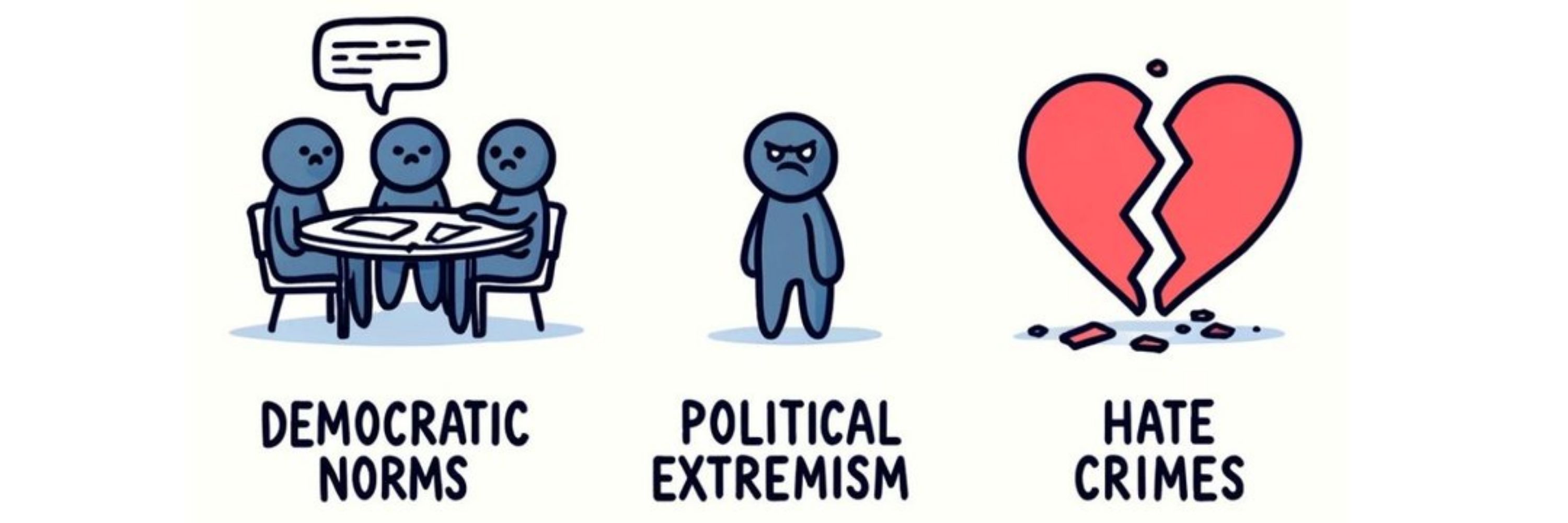
Out in @bjpols.bsky.social with Lasse Laustsen
Interstate Conflict Increases the Appeal of Undemocratic Candidates - https://cup.org/3Lx7bjx
"undemocratic candidates are evaluated more positively under conflict compared to peace"
- @kristianvsf.bsky.social & Lasse Laustsen
#OpenAccess

Out in @bjpols.bsky.social with Lasse Laustsen
“Right-Wing Terror, Media Backlash, and Voting Preferences for the Far Right” in @bjpols.bsky.social
👉 doi.org/10.1017/S000...
We (Alex De Juan, @juvoss.bsky.social & I) examine how right-wing attacks shape support for the far-right in Germany.
Short summary thread below 👇

“Right-Wing Terror, Media Backlash, and Voting Preferences for the Far Right” in @bjpols.bsky.social
👉 doi.org/10.1017/S000...
We (Alex De Juan, @juvoss.bsky.social & I) examine how right-wing attacks shape support for the far-right in Germany.
Short summary thread below 👇

onlinelibrary.wiley.com/doi/10.1111/...

onlinelibrary.wiley.com/doi/10.1111/...
Why do politicians often misperceive what citizens' policy positions are?
@simonotjes.bsky.social and I study ~10,000 estimates of public opinion by politicians in Denmark & the Netherlands to uncover the sources of these (mis)perceptions
Thread 🧵1/10

Why do politicians often misperceive what citizens' policy positions are?
@simonotjes.bsky.social and I study ~10,000 estimates of public opinion by politicians in Denmark & the Netherlands to uncover the sources of these (mis)perceptions
Thread 🧵1/10
How Mainstream Politicians Erode Norms - cup.org/4lfeHvD
"we find that statements by mainstream politicians lead to more norm erosion than similar statements by radical-right politicians"
- @valentimvicente.bsky.social, Elias Dinas & @dziblatt.bsky.social
#OpenAccess
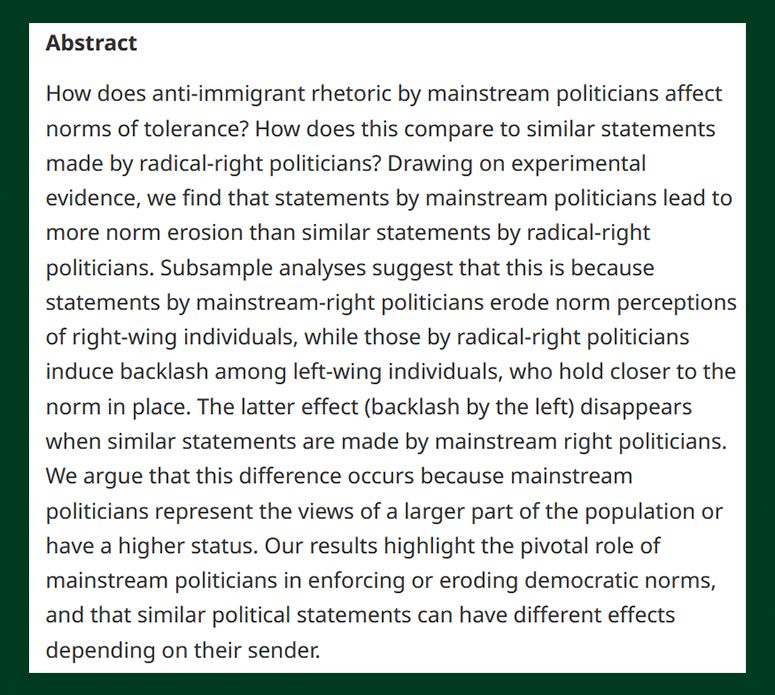
How Mainstream Politicians Erode Norms - cup.org/4lfeHvD
"we find that statements by mainstream politicians lead to more norm erosion than similar statements by radical-right politicians"
- @valentimvicente.bsky.social, Elias Dinas & @dziblatt.bsky.social
#OpenAccess
Media Platforming and the Normalisation of Extreme Right Views - cup.org/4mmVIAL
"exposure to uncritical interviews increases agreement with extreme statements and perceptions of broader support in the population"
- @dianebolet.bsky.social & @florianfoos.bsky.social
#OpenAccess
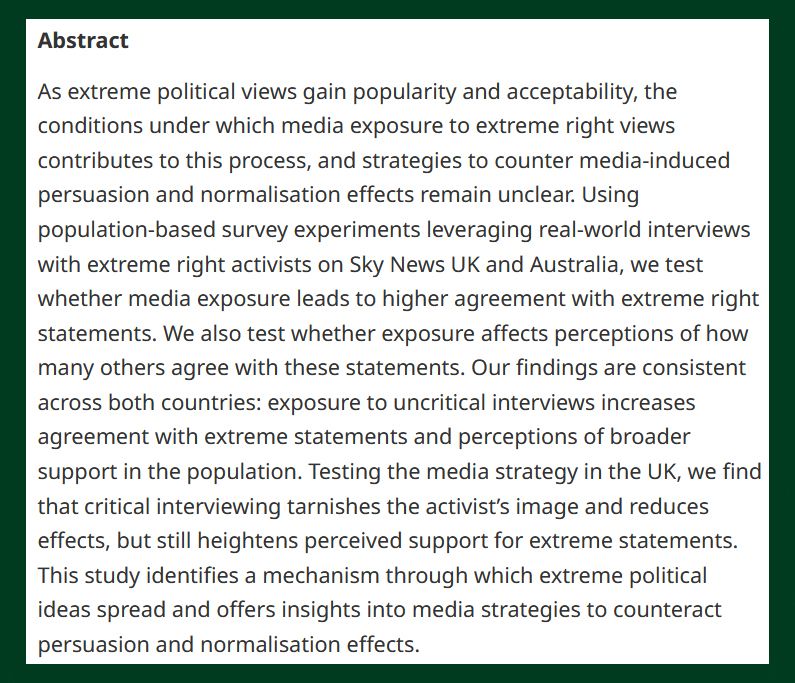
Media Platforming and the Normalisation of Extreme Right Views - cup.org/4mmVIAL
"exposure to uncritical interviews increases agreement with extreme statements and perceptions of broader support in the population"
- @dianebolet.bsky.social & @florianfoos.bsky.social
#OpenAccess
We ran an experiment in 🇩🇪 testing how people react to farmers vs. climate activists blocking roads.
What we find is disturbing:
osf.io/preprints/os...
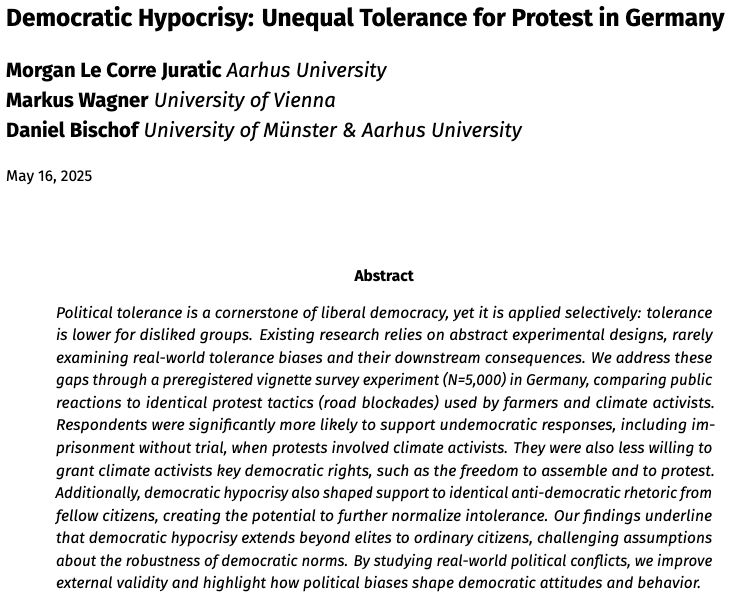
We ran an experiment in 🇩🇪 testing how people react to farmers vs. climate activists blocking roads.
What we find is disturbing:
osf.io/preprints/os...
Available online & in print (EN): www.wallstein-verlag.de/978383535866...
🧵 Some key findings: 👇
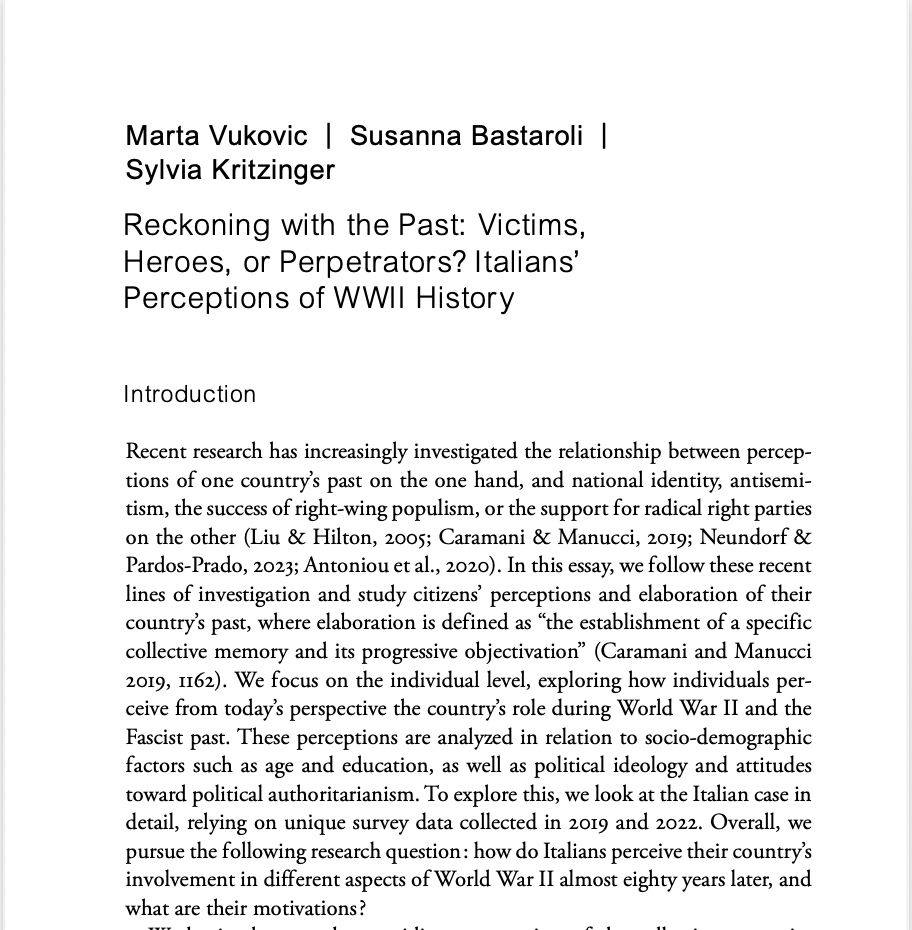
Available online & in print (EN): www.wallstein-verlag.de/978383535866...
🧵 Some key findings: 👇
Against the surge of conjoints and other hypothetical experiments in relation to democratic backsliding, we study the consequences of using hypotheticals versus real-world scenarios.
osf.io/preprints/os...
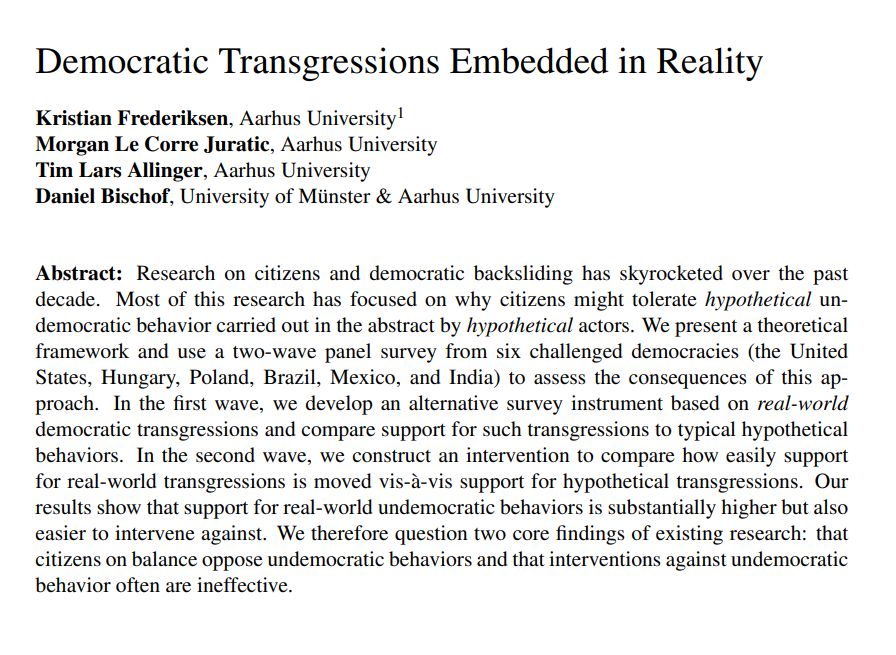
Against the surge of conjoints and other hypothetical experiments in relation to democratic backsliding, we study the consequences of using hypotheticals versus real-world scenarios.
osf.io/preprints/os...
Using a field experiment, we find that, in the real world, it is more costly to express far-right preferences than other political preferences.
osf.io/preprints/os...
1/8
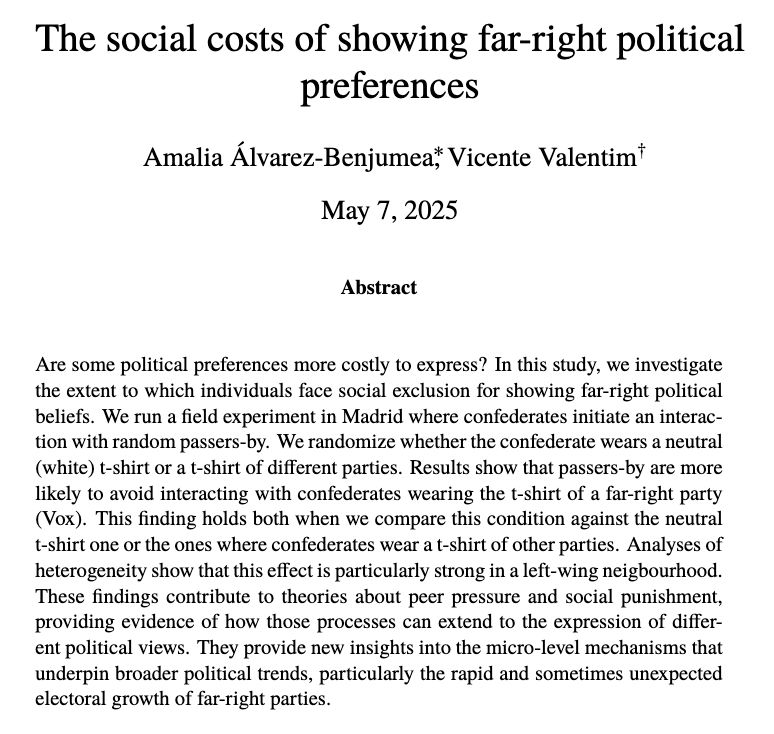
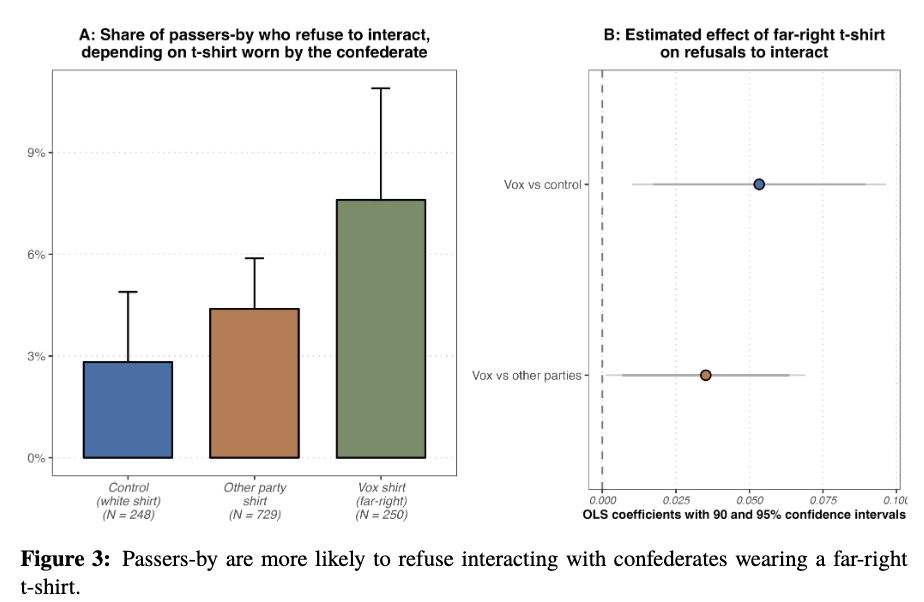
Using a field experiment, we find that, in the real world, it is more costly to express far-right preferences than other political preferences.
osf.io/preprints/os...
1/8
I answer this question in a new paper officially out at @psrm.bsky.social❗
Check out the paper here: doi.org/10.1017/psrm...
Key take-aways in the thread below 🧵⬇️:

I answer this question in a new paper officially out at @psrm.bsky.social❗
Check out the paper here: doi.org/10.1017/psrm...
Key take-aways in the thread below 🧵⬇️:
📰 Does (immigration) framing influence public opinion?
🧵
www.tandfonline.com/doi/full/10....

📰 Does (immigration) framing influence public opinion?
🧵
www.tandfonline.com/doi/full/10....

📚 I examine whether MPs' attention to local issues in parliamentary activities affects their re-election chances in party-centred contexts
www.tandfonline.com/eprint/G2HVG...
Ungated version here: eavigano.github.io/papers/jepop...
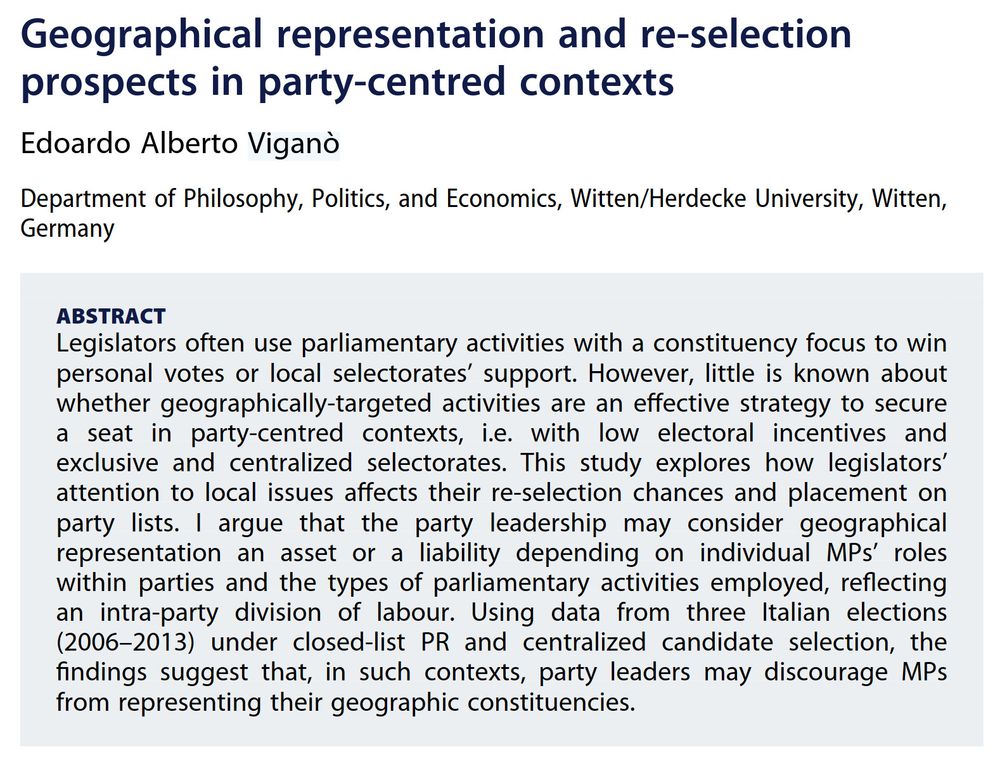
📚 I examine whether MPs' attention to local issues in parliamentary activities affects their re-election chances in party-centred contexts
www.tandfonline.com/eprint/G2HVG...
Ungated version here: eavigano.github.io/papers/jepop...
: "Citizens' Preferences for Multidimensional Representation". Jack Blumenau, Fabio Wolkenstein & I investigate citizens' preferences regarding 6 dimensions of representation using surveys conducted in 🇬🇧🇺🇸🇩🇪. Short 🧵(1/10) doi.org/10.1017/S15375
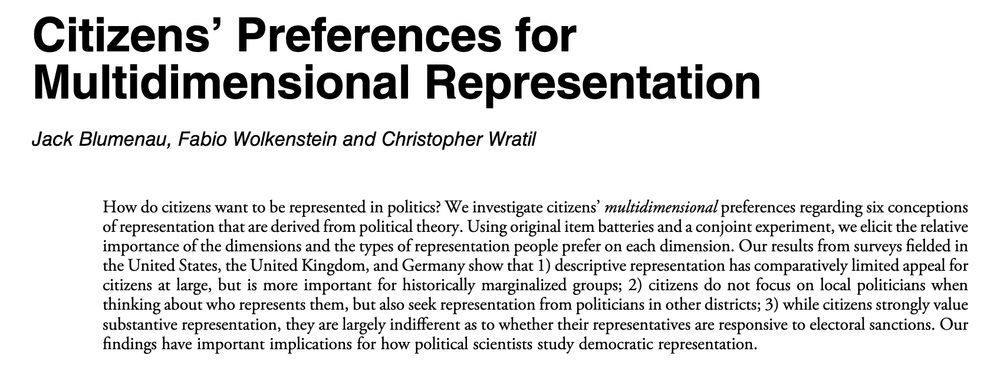
: "Citizens' Preferences for Multidimensional Representation". Jack Blumenau, Fabio Wolkenstein & I investigate citizens' preferences regarding 6 dimensions of representation using surveys conducted in 🇬🇧🇺🇸🇩🇪. Short 🧵(1/10) doi.org/10.1017/S15375
How do protesters' demographics and policy preferences affect politicians' responsiveness to their demands? I find no effects of shared demographics btw. protesters and politicians, but asymmetric responsiveness to left-right policy preferences: gupea.ub.gu.se/handle/2077/...
How do protesters' demographics and policy preferences affect politicians' responsiveness to their demands? I find no effects of shared demographics btw. protesters and politicians, but asymmetric responsiveness to left-right policy preferences: gupea.ub.gu.se/handle/2077/...
In “When Migrants Mobilize against Labor Exploitation: Evidence from the Italian Farmlands,” I study how empowering undocumented migrants can reduce labor exploitation and even weaken organized crime.
Thread : 🧵
In “When Migrants Mobilize against Labor Exploitation: Evidence from the Italian Farmlands,” I study how empowering undocumented migrants can reduce labor exploitation and even weaken organized crime.
Thread : 🧵
Our new @thejop.bsky.social paper, (@henrikseeberg.bsky.social, @martinbaekgaard.bsky.social ) asks: How do winning and losing candidates see elections?
Spoiler: Losers are more concerned about fairness.
Link: doi.org/10.1086/734240

Our new @thejop.bsky.social paper, (@henrikseeberg.bsky.social, @martinbaekgaard.bsky.social ) asks: How do winning and losing candidates see elections?
Spoiler: Losers are more concerned about fairness.
Link: doi.org/10.1086/734240
Excited to share that my article has just been published at @apsrjournal.bsky.social!
It examines voter responses to mainstream party legitimization of (former) pariah parties.
A thread 👇1/n...
doi.org/10.1017/S000...
Excited to share that my article has just been published at @apsrjournal.bsky.social!
It examines voter responses to mainstream party legitimization of (former) pariah parties.
A thread 👇1/n...
doi.org/10.1017/S000...
We are hiring 2 postdocs for the new Advertising Democracy project at Aarhus University.
We are looking for researchers who are passionate about advertisements & citizens’ democratic values in Western democracies.
Feel free to share!👇🏾
bss.au.dk/en/about-aar...

We are hiring 2 postdocs for the new Advertising Democracy project at Aarhus University.
We are looking for researchers who are passionate about advertisements & citizens’ democratic values in Western democracies.
Feel free to share!👇🏾
bss.au.dk/en/about-aar...
If you’re interested in understanding why radical voters’ satisfaction with democracy decreases even when they make an electoral breakthrough, we have a mixed-method paper for you with @canalejoalvaro.bsky.social
Here is our draft: osf.io/7bfka 👀
Why does radical party entry reduce its voters' satisfaction with democracy (SWD)?
In a new preprint with @morganlcj.bsky.social, we argue this is because of the downstream effect of a disliked party win, and provide evidence consistent with our argument.
polsky

If you’re interested in understanding why radical voters’ satisfaction with democracy decreases even when they make an electoral breakthrough, we have a mixed-method paper for you with @canalejoalvaro.bsky.social
Here is our draft: osf.io/7bfka 👀
Some thoughts, if you are interested:
Some thoughts, if you are interested:

